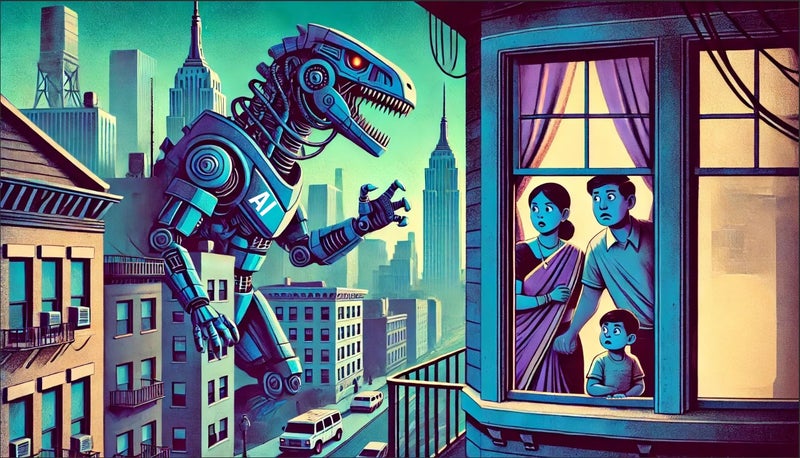Contents
- Power Struggles and Fearmongering: The Markers of Change
- The Real Issue Isn’t AI or Remote Work: It’s Us
- Fact-Based Thinking: Going Against the Flow
- Going Against Your Story Instincts
- Beating The Stress Test as a Top Performer
- The New Career Agenda: AI and Remote
Afraid AI and remote work are secret villains? Discover why these modern tools are not the problem, but there is something much BIGGER that could be.
Breaking news: AI makes you lonely and unhealthy.
And just between you and me (and the folks who worked across these four new studies) people who use AI at work are…lean closer.
They’re drinking more and they’re not sleeping as much.
‘This old rubbish argument,’ I immediately thought.
According to a recent article published in Harvard Business Review, interacting with artificial intelligence supports the rising ‘asocial system’ taking over the workplace.
And we should all be TERRIFIED of this shift towards the loneliness EPIDEMIC.
The message is clear: Interacting with machines means less interacting with humans. And that’s bad. Like robotic AI dinosaurs destroying your neighborhood, bad.
If the fearmongering sounds familiar that’s because it is.
Every other day a new article crops up online warning people that remote work will – you guessed it – make them lonelier and unhealthy.
If you work remotely folks, machines will be your undoing. This old chestnut never seems to go out of fashion.
Sure, the psychological effects of working remotely and with AI are valid. But you can’t make technology evil, no matter how juicy that story runs.
Blaming ‘things’ instead of human behavior feels great, but is ultimately shortsighted. It creates fear and disempowers people.
And that’s what it’s meant to do.
"Why bother learning AI?” you might think, “I’m not aiming to be a martini-swilling hermit banned from flights for unchecked under-eye baggage."

The danger is that there’s a bigger problem here. It doesn’t help anyone to ignore it or be distracted by reductive, fear-ridden research with hidden agendas.
Let’s remember what’s happening and address the REAL villain in the room.
Power Struggles and Fearmongering: The Markers of Change
“You need the villain. If you don’t have a villain, the good guy can stay home.” – Christoph Waltz

Is it co-incidence that AI and remote work are suddenly partners in crime? Threats that must be avoided/handled with extreme caution/ignored? No.
They’re scapegoats.
One of many throughout history. Let me explain!
Corporations are tired of being villainized, sick of change that gives employees unprecedented freedom and frustrated with how many options new technology is giving them.
COVID-19 really showed people what life could be at home.
These are facts.
Throughout human history it’s been this way.
Power structures have raged against CHANGE that has weakened control over the workforce and endangered existing societal norms.
- The Printing Press in the 1400’s promised literacy and mass communication, which would help people think independently. It threatened society so religious institutions and feudal Lords opposed it. Real change did happen. Through the spread of information by 1530, Protestantism grew by 52.1%.
- The Automobile in the early 20th century offered untold mobility, which liberated people from having to use public transport. Railroad and horse-drawn carriage companies lobbied like crazy to villainize cars and make them seem unsafe and dangerous. Until road structures and safety were established!
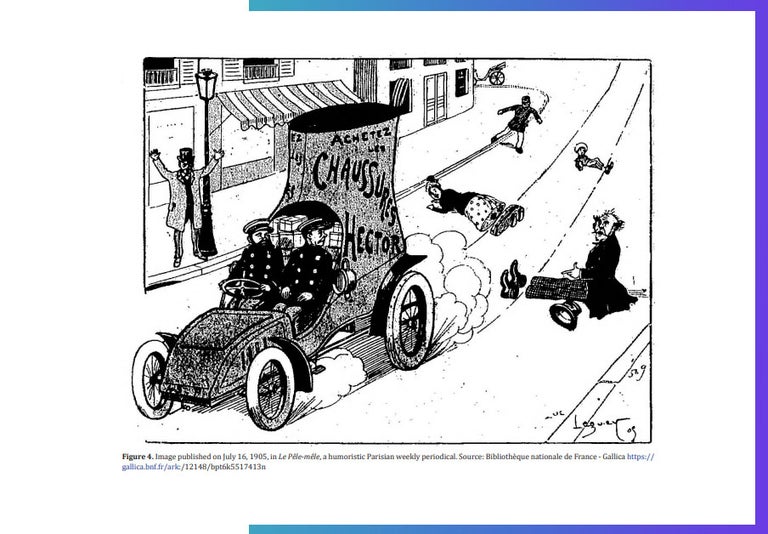
- Personal computers and the internet in the late 20th century brought amazing change, information access and centralization, education and social connection. Society feared the decentralization of control and called the internet ‘the digital wild west.’ Since this moment in time, the core arguments have been the same: social isolation, mental health concerns, insomnia.
- AI and remote work in the 21st century brings the same, but X1000. More progress. Greater flexibility and connection, autonomy over work location, and the freeing of human time thanks to automation. Big surprise, power structures aren’t happy because of the loss of control.
New studies are launched to confirm old arguments.
Fearmongering runs rampant!
If history has taught us anything it’s that power hates change.
And there’s always great resistance and misinformation because of this change.
It pays to remember this. It pays to remember that people who break history, make history. Those who embrace change and progress, are the people who thrive.
And that is the REAL issue.
The Real Issue Isn’t AI or Remote Work: It’s Us
People hate change. They hate new things.
Until the hard work is done, and new becomes normal again.
Forgetting that society often villainizes what is new is one thing. But allowing yourself to internalize these disempowering – and false – truths won’t serve you in your career.

As Taylor Swift once said in her song anti-hero, “It’s me, hi, I’m the problem it’s me.”
These carefully created arguments are designed to discourage you from being part of the progress that will eventually dismantle or drastically change the current system.
Yikes. So, what can you do?
Fact-Based Thinking: Going Against the Flow
Some years ago, I read a book called Factfulness, by Hans Rosling.
His argument was that the doom and gloom reported in the media is entirely false, and that actually – the world is improving every year.
He backs it up with hardcore data and statistics.
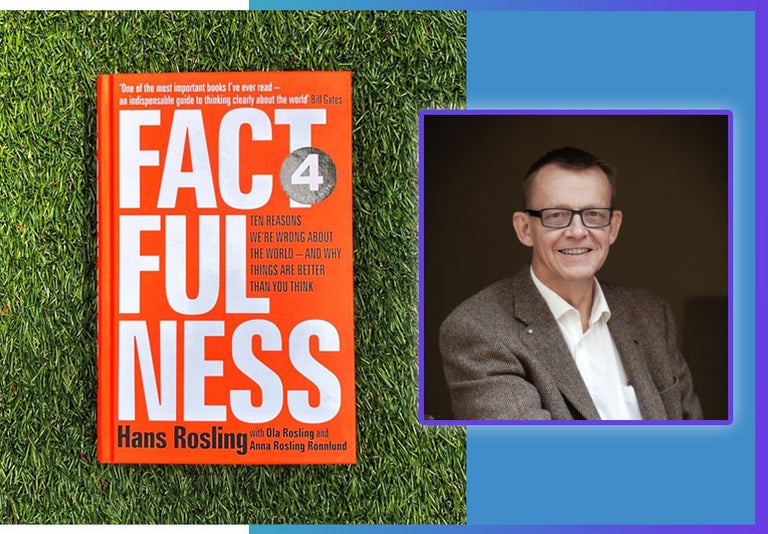
This data proves that the world is evolving towards greater health, wealth and wellness, which completely contradicts the pessimistic media narratives we’re so used to.
This evolution is thanks in large part to technology and progress.
He says a fact-based worldview, optimism and action are the most direct routes to making decisions that logically make sense.
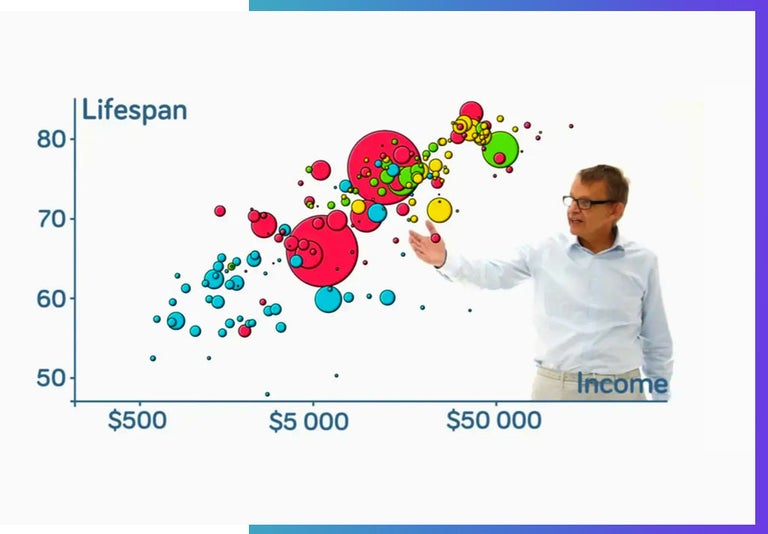
Here’s what we know:
- Change has an overall net positive impact for people (yay advancement!)
- Progress and technological change come with problems (adjustment is a process)
- It also comes with solutions we can scarcely imagine yet (everything will be better)
The receipts don’t lie.
And what we can learn from this - as remote workers - is that advancement is about how you handle adjustment.
Sometimes that means disagreeing with everyone else.
Going Against Your Story Instincts
There are 2 of Hans Rosling’s commandments that will help you think more clearly about your career. I’ve spoken about them in this article already.
- The Blame Instinct: You need to resist finding a scapegoat (like remote work and AI) and instead look for underlying systemic causes, like the ones I’ve offered.
- The Fear Instinct: You need to distinguish between real and perceived dangers by assessing the actual risks, and by looking at who is reporting on them.
Critical thinking flies out of the window when you’re scared.
Companies love your compliance – passive, fearful and totally under their control. They want you to believe that AI and remote work will leave you isolated and a mess of a human being.
But historical and empirical evidence paints a different picture!
That’s why the real problem is believing them and remaining stagnant.
As long as you’re not tapping into the transformative nature of AI while working remotely, you are tethered in place. To an old, dying system struggling to survive.
Let’s shake it up.
Beating The Stress Test as a Top Performer
Right now, I want to challenge you.
The barrier keeping you from progress is adjustment anxiety fueled by instincts that you need to override. With the pace of change being what it is – tech careers can feel like one big stress test.

You are operating under extreme conditions. The pressure is intense and conflicting perspectives are everywhere. One minute there’s a talent boom, then a shortage. We have mass hires, then layoffs (62,000 this year alone in the US).
Companies are unethically forcing people to quit by instituting nonsensical return to office mandates. You’re being docked pay for staying remote.
The change is swift and relentless. Fear is truly around every corner.
This is when it pays to think clearly.
That’s why you need to make peace with your adjustment anxiety. It’s only going to escalate as AI intensifies.
Change is here, and it’s forever.
Here are some tips:
- Prioritize Stress Management – let’s all agree extraordinary stress requires extraordinary management. Professional self-care has never been more important. Your ability to ‘go with the flow,’ adapt and adjust at speed will determine your future in tech. If you’re not handling it well, prioritize new coping methods. Learn to embrace change, easily. Balance is the key.
- Upskill for Career Progress – skills are the new currency, I’ve said it before. But it goes beyond being a consistent learner. Top performers must make daily time to learn to keep up with AI’s advances. Over the next decade AI will replace many jobs that can be automated, and will fundamentally change every other tech job. Fact. You must enhance and expand through a variety of learning mechanisms.
- Reskill for Career Pivoting – don’t put all your eggs in one basket, as they say. Tech people are jumping into new niches, fresh positions and previously unknown areas all the time. Many AI-related skills will be applicable across a wide range of roles. Broadening your AI skillset is smart and will lead to faster promotions. Concurrent skill -building is a career strategy that works.
On Crossover we’ve had many top performers who have switched over to using AI in their daily lives. These are the individuals who will make the biggest impact in the future.
See how Ben, an SVP of Product Management uses AI here.
The New Career Agenda: AI and Remote
Darwin said, “It is not the most intellectual of the species that survives; it is not the strongest that survives; but the species that survives is the one that is able best to adapt and adjust to the changing environment in which it finds itself.”
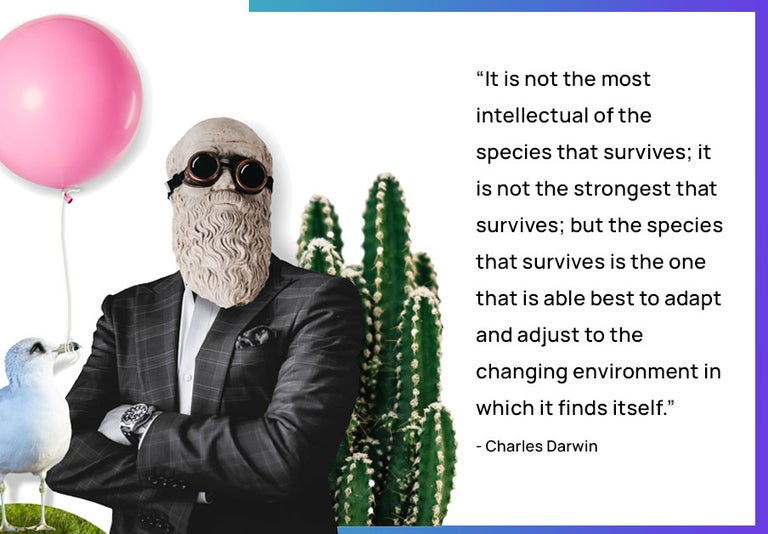
If you want to advance rapidly in your career – you must learn to adjust.
These days that means looking beyond the sensationalist headlines circulating online that repeatedly tell us: AI is bad! Remote work is worse!
None of these things are true if you are aligned with progress.
Progress demands boundaries and balance. It expects constant change and a higher-level ability to manage the predictors of stress.
Lisa Feldman Barrett, a neuroscientist, author and psychology professor at Northeastern University has a theory about stress and high performers.
“Highly successful people get ahead of stress with a key mindset shift. They don’t see stress as something bad to be overcome, but instead as something natural that can be managed.”
Isolation, insomnia, unwellness – these are all predictors of stress. Learn to manage your stress and they never have to keep you from career progress or pivots.
When you love a villain and hate change, it’s easy to be influenced in the wrong direction by agendas that were never yours.
It’s a subtle and insidious demotivation that robs you of your future.

The truth is that AI and remote work aren’t villains at all. It's your fear of change and the narratives spun by those terrified of losing control who are the real villains.
Wake up to the scapegoating!
While the doomsayers focus on hypothetical loneliness and health scares, the real story is about empowerment and the opportunities these technologies usher in.
History shows us that those who embrace change - not fear it - shape the future.
In which direction are you shaping yours?


